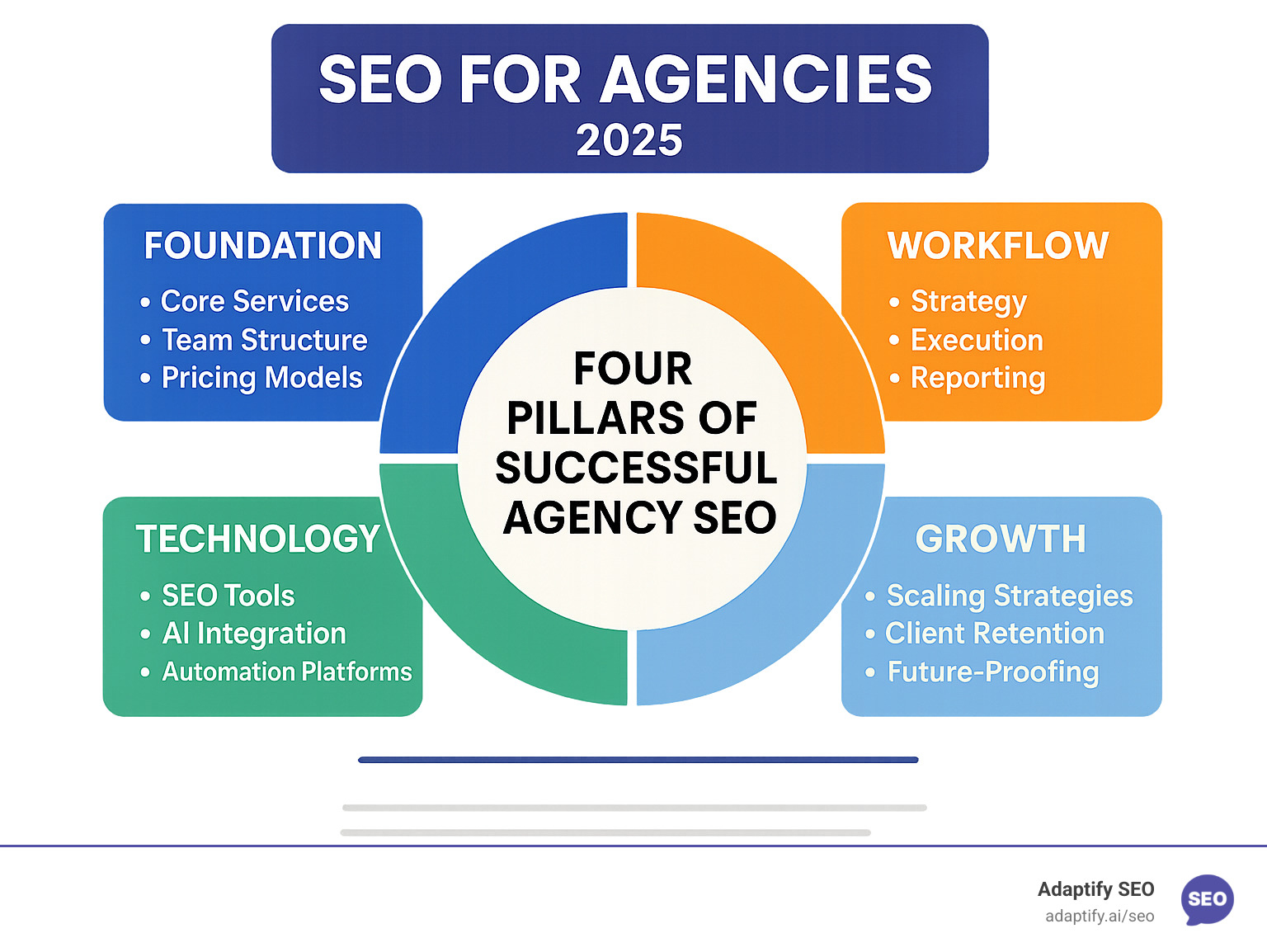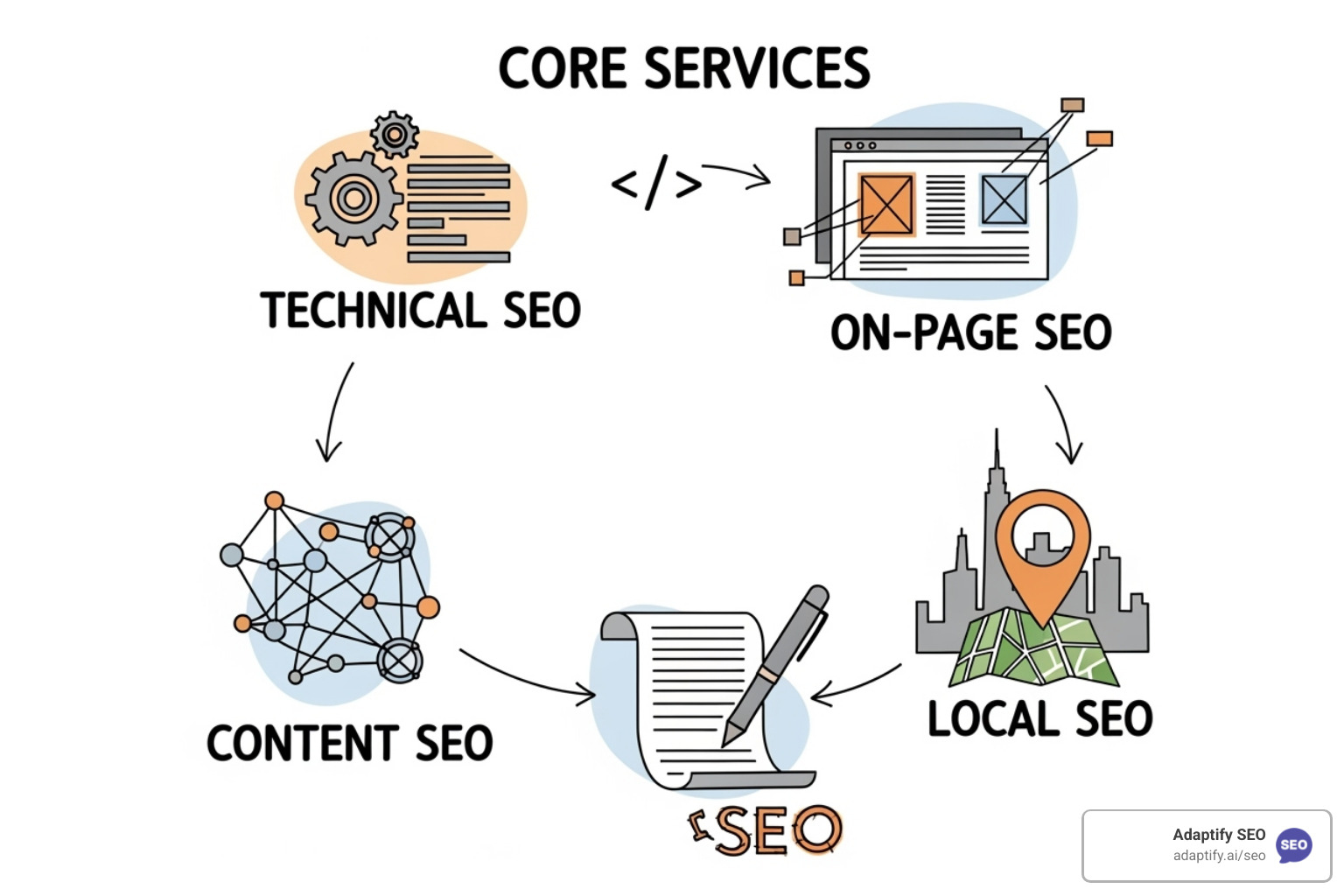The Ultimate Guide to SEO for Agencies
Hansjan Kamerling
Oct 31
Why SEO for Agencies is More Critical Than Ever

SEO for Agencies has evolved far beyond basic keyword optimization as search engine optimization (SEO) itself has matured. In today's AI-driven landscape, where search results are increasingly generated by algorithms, agencies must master a complex ecosystem of high-level strategy, intelligent automation, and impeccable client management to deliver measurable results at scale. The days of simply tweaking meta tags are long gone; success now hinges on navigating a sophisticated digital environment where data is abundant but insights are scarce.
Core Components of Agency SEO:
- Strategic Services: Deep keyword research, comprehensive competitor analysis, forensic technical audits, and authoritative content strategy.
- Execution Models: Retainer, project-based, and hybrid pricing structures designed for flexibility and value.
- Team Structure: A synergistic blend of SEO specialists, content creators, outreach experts, and project managers.
- Technology Stack: A mix of all-in-one platforms, specialized tools, and transformative AI automation.
- Client Management: A commitment to transparent reporting, proactive communication, and long-term relationship building.
The challenges are significant and multifaceted. One survey found that "52.3% of digital marketers... find link building the hardest part of SEO," a sentiment that echoes across the industry. Meanwhile, critics claim "99% of agencies only work to create attractive dashboards without making any serious impact on organic growth." These pain points highlight a critical need for robust, scalable systems and the right technology to bridge the gap between activity and actual business outcomes.
However, the opportunity is equally compelling. The SEO market is projected to hit $157 billion by 2032, and agencies that master modern SEO can achieve client retention rates as high as 97%. This guide provides a comprehensive blueprint for building, managing, and scaling a future-proof SEO agency, turning today's challenges into tomorrow's opportunities for unprecedented growth.

Building the Foundation: Core Services & Agency Structure
Think of building an SEO agency like constructing a house—the foundation is everything. For SEO for Agencies, this means defining your core services with precision, building an effective and scalable team, and choosing pricing models that ensure profitability and client satisfaction. Getting this right isn't just a preliminary step; it sets the stage for long-term success and resilience in a competitive market.

Defining Your Core SEO Service Offerings
An agency's services are the building blocks of its value proposition. While offerings can be customized, a strong foundation includes:
- Keyword Research: This foundational task goes beyond simple search terms. It involves deep analysis of user intent (informational, navigational, transactional), competitive keyword gaps, and long-tail opportunities that competitors may have missed. The goal is to create a complete map of the customer's search journey.
- Content Optimization: This is a two-pronged effort: creating new, high-value content and optimizing existing assets. It covers everything from technical elements like title tags and meta descriptions to crafting in-depth articles, case studies, and landing pages that establish authority and drive conversions.
- Technical Site Audits: This crucial behind-the-scenes work ensures search engines can crawl, render, and index a site effectively. Audits identify and provide solutions for issues like slow page speed, mobile usability problems, poor site architecture, improper canonicalization, broken schema markup, and inefficient crawl budget usage. Tracking Core Web Vitals is a key part of this ongoing process.
- Backlink Acquisition: Building high-quality links remains a top Google ranking factor. It signals to search engines that a client's site is authoritative and trustworthy. This service focuses on earning quality backlinks from relevant sources through strategic outreach, content promotion, and relationship building, avoiding spammy tactics that can harm a site's reputation.
- Local SEO: Essential for businesses targeting customers in a specific geographic area, this involves optimizing Google Business Profiles, managing online reviews, building local citations, and creating location-specific content. Agencies in major markets like New York, London, and Sydney often find this service is a primary driver of leads for their brick-and-mortar clients.
- E-commerce SEO: A highly specialized field focused on optimizing product pages, category pages, and faceted navigation to drive sales. It involves unique challenges like managing duplicate content from product variants and implementing robust product schema.
As one industry expert notes, "Good SEO (agency, firm, etc) is pricey, but they are definitely worth the investment." The comprehensive and specialized nature of these services explains why.
Structuring Your Team for Success
A well-structured team is vital for scaling client work without burnout or a drop in quality. Key roles include:
- Project Managers: The conductors of the orchestra, they manage timelines, allocate resources, and serve as the primary point of contact for clients, ensuring projects stay on track and communication is clear.
- SEO Strategists: The masterminds who analyze data, identify opportunities, and design the overall game plan. They are responsible for the 'why' behind the 'what', connecting all SEO activities to the client's business goals.
- Content Writers: Skilled creators who craft compelling, well-researched content that satisfies both search engine algorithms and, more importantly, human readers. They must be adept at writing for different formats and tones.
- Link Building Specialists: Part digital PR expert, part relationship-builder, these specialists secure valuable backlinks to boost site authority. They are masters of outreach, persuasion, and finding creative ways to earn links.
- Technical SEOs: The problem-solvers who dive into a website's code and infrastructure. They diagnose and fix complex technical issues related to site speed, JavaScript rendering, and internationalization (like hreflang implementation).
For larger clients, teams are often more layered. As one agency professional shared, "For our large clients, we typically have executives, a project manager, multiple SEOs, and a whole team of writers involved."
Choosing the Right Pricing Models
Pricing models must provide stability for the agency and clear value for the client. The most common models are:
- Retainer Models: Offering predictable monthly revenue, retainers are the bedrock of most successful agencies. They foster strong, long-term client relationships and allow for continuous, agile strategy adjustments. As one CEO explained, "Retainers account for a large % of our revenue... We love building strong working relationships with long-term clients."
- Project-Based Pricing: Ideal for specific, defined scopes like a one-time technical audit, a site migration project, or a content marketing campaign. This model offers clients upfront cost certainty and a clear deliverable.
- Performance-Based SEO: This model ties fees directly to results like rankings or traffic increases. While appealing to clients, it can be risky for agencies due to the many variables in SEO (like algorithm updates) that are outside their control.
- Hourly Consulting: Best for strategic advice, training, or specific, limited tasks. It offers maximum flexibility but can be less predictable for revenue planning and harder to scale.
Many successful agencies now use a hybrid approach, often combining a monthly retainer for ongoing strategy and management with project-based fees for large, one-off initiatives like a website redesign. This provides both stability and flexibility.
The Agency Workflow: From Strategy to Client Success
Once your foundation is solid, it's time to turn strategy into results. A well-defined SEO for Agencies workflow transforms initial client conversations into measurable success stories. This repeatable, scalable process should flow seamlessly from onboarding and research to execution and reporting, with transparency and trust-building embedded at every step.

Mastering Keyword Research and Competitor Analysis
The best SEO agencies think like detectives, digging deep to understand not just what customers search for, but why. User intent is paramount—are users looking to buy (transactional), compare options (commercial), or just gather information (informational)? This distinction shapes the entire content and on-page strategy.
Using powerful SEO tools like Ahrefs or Semrush, agencies analyze search volume and keyword difficulty to find the sweet spot between audience interest and manageable competition. A key part of this phase is identifying low-hanging fruit—valuable keywords where a client already ranks on page two or three. Improving these rankings can deliver quick wins and build early momentum and client confidence.
A backlink gap analysis, which compares a client's link profile to their top competitors, provides a clear roadmap for outreach efforts. Similarly, a content gap analysis reveals topics competitors are ranking for that the client has not yet covered. This strategic approach helps uncover niche opportunities that larger, less agile competitors may overlook.
The Pillars of Execution: Content and Link Building for Agencies
Content and link building are the twin engines of organic growth. Effective execution begins with detailed content briefs. These documents are the blueprint for success, guiding writers to produce high-quality articles that address user intent, target specific keywords, and include all the elements needed to outrank competitors. The goal is to create content that establishes the client as an undeniable authority.
Link building remains a significant challenge. As one survey revealed, "Still, 52.3% of digital marketers surveyed... said link building is the hardest part of SEO." Despite the difficulty, ethical, white-hat link building is incredibly effective. Proven tactics include:
- Guest Posting: Writing and publishing articles on relevant, high-authority sites in the client's industry.
- Broken Link Building: Finding dead links on other websites' resource pages and suggesting the client's content as a replacement.
- Digital PR: Creating link-worthy assets (like original research, surveys, or infographics) and promoting them to journalists and bloggers to earn high-authority editorial links.
Since link building is one of the top Google ranking factors, mastering this skill gives an agency a massive competitive advantage, driving both rankings and valuable referral traffic.
Proving Value: Client Reporting and Communication
Great agencies distinguish themselves through clear, insightful reporting and consistent communication. The focus must be on KPIs that matter to the business, not just vanity metrics.
- Organic traffic growth, conversion rates, and Share of Voice (SOV) are far more meaningful than keyword rankings alone.
- Custom dashboards should connect SEO activities directly to business results—like leads generated or revenue earned—in a way clients can easily understand. While some critics claim that "99% of agencies only work to create attractive dashboards without making any serious impact on organic growth," a well-designed dashboard does the opposite by demonstrating tangible ROI and justifying the investment.
Setting expectations is crucial. I always tell clients that "Most businesses see noticeable initial results during their first 3-6 months, but bigger improvements that drive significant revenue can take 6-12 months or more." This transparency builds the trust necessary for fruitful, long-term partnerships.
The Modern Toolkit: Essential SEO Software for Agencies
In the competitive world of SEO for Agencies, the right tools are not just an advantage—they are a necessity. A modern SEO toolkit is the backbone of any efficient and effective operation, enabling agencies to diagnose problems, uncover opportunities, execute campaigns, and report on results at scale. Without a powerful tech stack, an agency simply cannot compete.

Successful agencies across global markets like the US, UK, and Australia invest in robust tool stacks. These tools generally fall into a few key categories that form the foundation of a serious agency operation.
All-in-One SEO Suites
Comprehensive platforms like Ahrefs, Semrush, and Moz act as the Swiss Army knives of SEO. They offer a wide array of functions like competitor analysis, keyword research, site audits, and rank tracking. They are indispensable for managing multiple client campaigns and gathering market intelligence. However, each has its own strengths—Ahrefs is often lauded for its superior backlink index, while Semrush is known for its robust keyword and PPC data. Juggling multiple, expensive subscriptions and trying to synthesize data from these disparate platforms can be a major operational headache.
This is why Adaptify SEO's platform is so valuable. It provides a truly integrated solution designed specifically for agencies, streamlining strategy, content, and link building into a single, unified system. Its primary benefit is eliminating the friction and manual effort of switching between tools, allowing teams to focus on high-level strategy instead of data wrangling.
Specialized Tools for Technical, Content, and Local SEO
Beyond all-in-one suites, specialized tools provide deeper insights in specific areas.
- For technical SEO, site crawlers like Screaming Frog and Sitebulb are essential for identifying issues like broken links, crawl depth problems, and other on-page errors at scale. These are often used alongside Google's free tools such as Search Console and PageSpeed Insights for a complete picture of site health.
- For content optimization, tools like Surfer SEO and Clearscope use NLP to analyze top-ranking pages and provide data-driven recommendations for writers. They help ensure content is comprehensive and topically relevant, increasing its chances of ranking.
- For local SEO, platforms like BrightLocal and Whitespark help manage local rank tracking, citation building, and Google Business Profile optimization. Visual tools that map local search rankings are particularly effective for demonstrating progress to clients.
While a collection of specialized tools can be powerful, it adds complexity and cost. Adaptify SEO's platform is designed to centralize and automate many of these workflows, making it a superior solution for agency efficiency and scalability.
Leveraging AI in Your SEO for Agencies Strategy
The future of SEO for Agencies is inextricably linked with Artificial Intelligence. The question is no longer if AI will change agency operations, but how quickly agencies can adapt to leverage its power.
- AI-powered content creation has revolutionized content strategy, assisting with brainstorming, outlining, and even initial drafting. More advanced AI can also analyze SERP data to answer complex SEO questions, acting like an on-demand data scientist.
- AI for data analysis can process vast amounts of information from tools like Google Analytics and Search Console to identify patterns, anomalies, and opportunities far faster than any human team.
- Natural Language Processing (NLP) helps optimize content not just for keywords, but for the way humans actually search and speak, creating content that resonates better with users and search engines.
With the rise of AI-generated search results, agencies must now optimize for this new frontier. Adaptify SEO's AI-driven features are built to help agencies scale content and strategy efficiently, reducing the manual work that once consumed so much time. This allows your team to focus on high-level thinking and ensures clients stay ahead in an AI-driven world.
Scaling Your Agency: Overcoming Challenges and Embracing the Future of SEO for Agencies
Growing an SEO for Agencies business requires a delicate balance: delivering excellent results for current clients while simultaneously building systems to support future growth. The agencies that thrive are not those that avoid challenges, but those that anticipate them and build a resilient operational model to overcome them.
Navigating Common Agency Problems
Several common challenges can stall an agency's growth and even threaten its survival:
- Managing Client Expectations: SEO is a long-term investment, not an overnight fix. It's vital to communicate realistic timelines from the very first conversation. As I often tell clients, "Most businesses see noticeable initial results during their first 3-6 months, but bigger improvements that impact the bottom line can take 6-12 months or more." Failure to set this expectation leads to disappointment and churn.
- Proving ROI: Clients want to see how SEO efforts translate to business growth. This requires connecting campaigns directly to leads, sales, and revenue. It means going beyond rank tracking to implement robust conversion tracking in Google Analytics 4, setting up custom event tracking, and building reports that clearly attribute revenue to organic search.
- Scaling Operations: As an agency grows, maintaining quality and a personal touch becomes exponentially more difficult. Simply hiring more people without solid processes leads to inconsistent results, missed deadlines, and team burnout. The key is to develop and document Standard Operating Procedures (SOPs) for all repeatable tasks.
- Algorithm Updates: The SEO landscape is in a constant state of flux. Agencies must foster a culture of continuous learning and be agile enough to adapt their strategies when major updates roll out.
- Client Churn: High churn is almost always a symptom of one of the problems above—poor communication, inconsistent results, or a failure to demonstrate value. Reducing churn is the single most effective way to grow agency revenue.
Offering flexible service models, such as a mix of DIY software and done-for-you services, can help agencies serve a broader range of clients and mitigate some of these challenges.
Standing Out in a Crowded Market
With thousands of agencies competing for business, differentiation is essential for survival and profitability.
- Niching Down: Specializing in a specific industry (e.g., e-commerce, healthcare, legal) or service (e.g., technical SEO for enterprise sites) allows you to become a go-to expert. Niche agencies can command premium rates, develop more efficient workflows, and deliver better results because they deeply understand their clients' business.
- Building Compelling Case Studies: Real results from real clients are your most powerful marketing tool. A detailed case study showing how you increased a client's organic leads by 200% is infinitely more persuasive than any sales pitch.
- Radical Transparency: Be open about your process, pricing, and even your challenges. Clear, proactive communication builds the trust that underpins strong, long-lasting client relationships.
- Unique Selling Proposition (USP): Clearly define what makes your agency different. Is it your proprietary process, your industry specialization, or your technology? For us at Adaptify SEO, it's our comprehensive AI-powered automation that streamlines the entire SEO process, enabling agencies to scale without scaling headcount.
- High Client Retention: A high retention rate is a clear signal of consistent value and strong partnerships. Don't be afraid to feature your retention rate as a key differentiator in your marketing materials.
Future-Proofing Your Agency with Automation and AI
The future of SEO for Agencies is about leveraging technology to work smarter, not harder. Automation and AI are the keys to unlocking scalability and profitability.
- AI-Driven Strategy: AI can analyze market trends, competitor strategies, and vast datasets at a scale no human team can match. This leads to more agile, data-driven plans that can pivot quickly.
- Automated Workflows: Automation eliminates repetitive, low-value tasks like data collection for monthly reports, rank tracking, and basic site health checks. This frees up your talented team for strategic thinking, creative problem-solving, and client management.
- White-Label SEO Solutions: These platforms allow agencies to offer comprehensive SEO services under their own brand. While some platforms like Semrush offer white-label reporting, a true white-label execution platform is far more powerful. It allows you to leverage proven systems and expert execution without the overhead of building and managing a large in-house team.
By reducing manual effort, automation improves consistency, reduces errors, and enhances scalability. Agencies using platforms like Adaptify SEO report significant time savings and better client outcomes, allowing them to focus on growth.
Frequently Asked Questions about SEO for Agencies
Over the years, I've noticed the same questions about SEO for Agencies come up repeatedly from both prospective clients and fellow agency owners. Here are detailed answers to the three most common concerns.
How long does it take to see results from SEO?
This is the million-dollar question, and the honest answer is: it depends. However, a reliable benchmark is that most SEO experts agree it typically takes four to six months to see initial, noticeable results, such as an increase in keyword rankings and organic traffic. Significant improvements that directly impact revenue and lead generation often take 6 to 12 months or longer. The timeline depends heavily on several key factors:
- Website History & Authority: A brand-new website will take longer to gain traction than an established site with a history of quality content and backlinks.
- Level of Competition: Ranking for keywords in a highly competitive niche (like insurance or finance) will take significantly more time and resources than in a less crowded market.
- Budget & Resource Allocation: A more aggressive SEO strategy with a larger budget for content creation and link building will naturally yield faster results.
- Technical Foundation: If a website has significant underlying technical issues, these must be fixed before any content or link-building efforts can be fully effective.
It's crucial to set this expectation with clients from the beginning. SEO is a marathon, not a sprint, and transparency about timelines is essential for a healthy, long-term agency-client relationship.
Is SEO still relevant with the rise of AI search?
Yes, SEO is more relevant than ever, but its focus is evolving. The rise of AI Overviews (like in Google's SGE) and generative search engines means the game is shifting. The goal is no longer just to rank #1 on a list of blue links, but to become an authoritative, citable source that AI models trust and reference in their generated answers. When an AI generates an answer, it pulls information from the same high-quality, well-optimized, and trustworthy content that traditional SEO has always championed.
Core SEO principles—technical health, quality content that demonstrates expertise, and authority signals like backlinks—are now the fundamental requirements for visibility in these new AI-driven ecosystems. In fact, the bar for quality has been raised, making genuine expertise and authority more important than ever. The agencies that thrive will be those that master optimization for both traditional search and as a primary source for AI.
What are the most common challenges faced by SEO agencies?
The most common challenges are managing unrealistic client expectations, proving the direct ROI of SEO efforts, and scaling operations without sacrificing quality.
These issues are often interconnected. Unrealistic expectations lead to client frustration when results aren't immediate. Proving ROI can be complex because SEO's benefits often build over time and across multiple touchpoints in the customer journey, making direct attribution difficult without proper setup. Finally, many agencies struggle to scale because their processes are too manual and reliant on individual heroics. This leads to burnout, inconsistent quality, and an operational ceiling as they add more clients.
A fourth, related challenge is talent acquisition and retention. Finding and keeping skilled SEO professionals is difficult and expensive. The agencies that overcome these challenges invest heavily in transparent communication, robust analytics and tracking, and efficient, scalable processes. This is where automation and AI become critical. Platforms like Adaptify SEO help agencies tackle these core issues by improving efficiency, consistency, and reporting, which leads to greater client satisfaction and retention.
Conclusion
Building a thriving SEO for Agencies business today requires a sophisticated blend of foundational expertise, streamlined execution, and a forward-thinking approach to technology. From structuring your services and pricing to mastering client reporting and scaling your team, every piece of the puzzle matters more than ever.
The agencies that will win the future are not just keeping up with change—they are embracing it as an opportunity. As the industry moves decisively toward greater automation and AI integration, the most successful agencies will be those that leverage these tools to work smarter, improve efficiency, and deliver superior, data-driven results for their clients. This isn't about replacing human strategists; it's about empowering them to do their best work.
This is exactly why we built Adaptify SEO. With a presence in the US, UK, and Australia, we understand the global challenges agencies face with manual, time-consuming workflows that limit growth and lead to burnout. Our AI-powered, end-to-end SEO solution is designed for agencies that want to focus on strategy and client relationships while our platform handles the heavy lifting of execution.
Stop burning out on manual tasks and start scaling intelligently. Imagine having the bandwidth to grow your client base without sacrificing quality, all because your processes are streamlined, automated, and powered by a platform built for agency success.
Ready to lift your agency? Book a Demo to see how you can automate your SEO and scale smarter.

